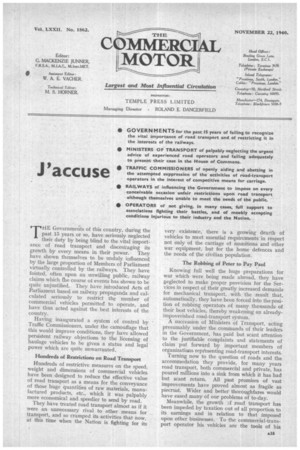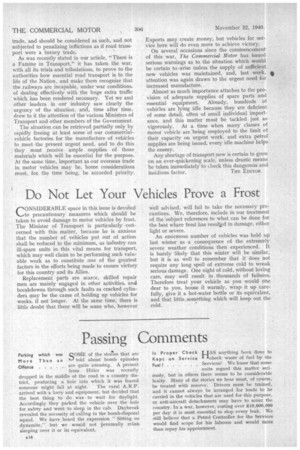T HE Governments of this country, during the past 15 years
Page 17

Page 18

If you've noticed an error in this article please click here to report it so we can fix it.
or so, have seriously neglected their duty by being blind to the vital importance of road transport and discouraging its growth by every means in their power. They have shown themselves to be unduly influenced by the large proportion of Members of Parliament virtually controlled by the railways. They have foisted, often upon an unwilling public, railway claims which fhe course of events has shown to be quite unjustified. They have introduced Acts of Parliament based on railway propaganda and calculated seriously to restrict the number of commercial vehicles permitted to operate, and have thus acted against the best interests of the country.
Having inaugurated a system of control by Traffic Commissioners, under the camouflage that this would improve conditions, they have allowed persistent railway objections to the licensing of haulage vehicles to be given a status and legal power which are quite unwarranted.
Hundreds of Restrictions on Road Transport Hundreds of restrictive measures on the speed, weight and dimensions of commercial vehicles have been designed to reduce the effective value of road transport as a means for the conveyance of those huge quantities of raw materials, manufactured products, etc., which it was palpably more economical and speedier to send by road. They have treated road transport almost as if it were an unnecessary rival to other means for transport, and so cramped its activities that now, at this time when the Nation is fighting for its very existence, there is a growing dearth of vehicles to meet essential requirements in respect not only of the carriage of munitions and other war equipment, but for the home defences and the needs of the civilian population.
The Robbing of Peter to Pay Paul Knowing full well the huge preparations for war which were being made abroad, they have peglected to make proper provision for the Services in respect of their greatly increased demands for mechanical transport, with the result that, automatically, they have been forced into the position of robbing operators of many thousands of their best vehicles, thereby weakening an alreadyimpoverished road-transport system.
A succession of Ministers of Transport, acting presumably under the commands of their leaders in the Government, has paid but scant attention to the justifiable complaints and statements of• claim put forward by important members of organizations reptesenting road-transport interests.
Turning now to the question of roads and the accommodation they provide, for many years road transport, both commercial and private, has poured millions into a sink from which it has had but scant return. All past promises of vast improvements have proved almost as fragile as piecrust. Wider and better thoroughfares would have eased many of our problems of to-day.
Meanwhile, the growth f road transport has been impeded by taxation out of all proportion to its earnings and in relation to that imposed upon other. businesses. ' To the commercial-transport operator his vehicles are the tools of his trade, and should be considered as such, and not subjected to penalizing inflictions as if road transport were a luxury trade.
As was recently stated in our article, "There is a Famine in Transport," it has taken the war, with all its trials, and tribulations, to prove to the authorities how essential road transport is to the life of the Nation, and make them recognize that the railways are incapable, under-war conditions, of dealing effectively with the huge extra traffic which has been rendered necessary. Yet we and other leaders in our industry saw clearly the urgency of the situation, and, time after time, drew to it the attention of the various Ministers of Transport and other members of the Government.
• , The situation can be retrieved partially only by rapidly, freeing at least some of our commercialvehicle factories for the manufacture of vehicles to ,meet the present urgent need, and to do this they must receive ample supplies of those materials which will be essential for the purpose. At the same time, important a..s our overseas trade in motor vehicles may be, home considerations must, for the time being, be accorded priority. Exports may create money, but vehicles for service here will do even more to achieve victory.
On several occasions since the commencement of this war, The Commercial Motor has issued serious warnings as to the situation which would be certain to •arise unless the supply of sufficient new vehicles was maintained, and, last week, attention was again drawn to the urgent need for increased manufacture.
Almost as much importance attaches to the provision of adequate supplies of spare parts and essential equipment. Already, hundreds of vehicles are lying idle because they are deficient of some detail, often of small individual importance, and this matter must be tackled just as vigorously. At a time when many classes of motor vehicle are -being employed to the limit of their capacity on urgent work, and extra petrol supplies are being issued, every idle machine helps the enemy.
Any shortage of transport now is certain to grow on an ever-quickening scale, unless drastic means be taken immediately to check this dangerous and insidious factor. THE EDITOR.




















































